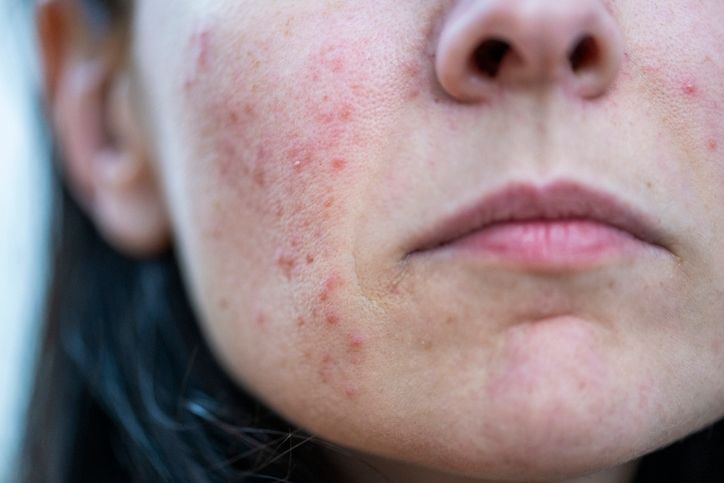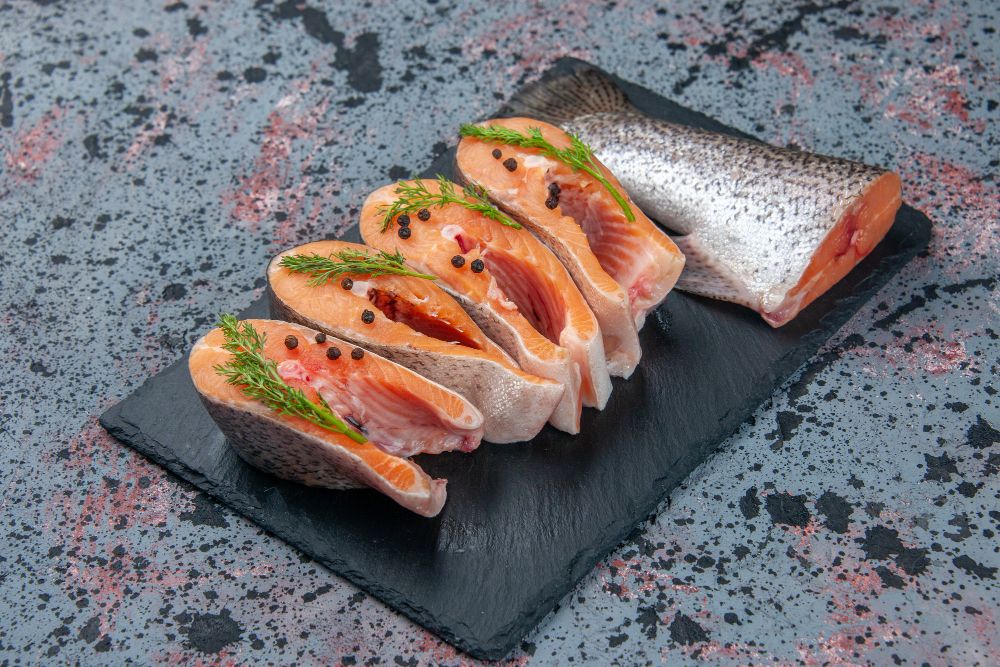
Author: Natalie Ng|Updated: 9 May 2025
If your hairbrush is catching more strands than usual, your diet might be part of the problem — and the solution. What you eat plays a bigger role in hair health than most people realise. A balanced diet filled with essential nutrients helps protect hair follicles, strengthens hair strands, and supports healthy hair growth. That’s because your hair cells rely on a steady supply of vitamins, minerals, and healthy fats to stay strong and grow properly. Deficiencies in iron, vitamin D, protein, and other nutrients can slow down growth, cause thinning, or even trigger hair loss. By making smart food choices, you can nourish your scalp, support hair development, and promote healthy hair from the inside out. You don’t need a complicated routine — just real food packed with what your body and hair need. In this article, we’ll go through 15 easy, nutrient-rich foods that can help support hair growth, stop hair fall, and strengthen hair from root to tip. Keep reading to see how small changes in your meals can improve hair strength and prevent future hair thinning.

Protein-Rich Quinoa and Ancient Grains
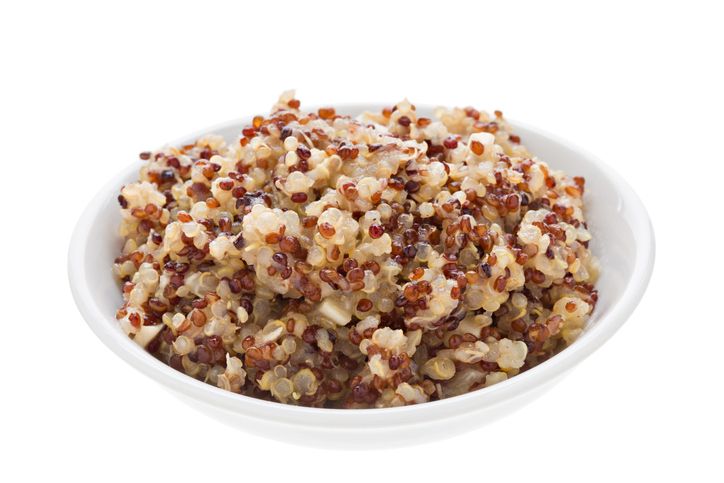
Complete plant proteins that support hair structure
Quinoa, amaranth, and millet are rich in protein and essential amino acids — both of which are key to building and repairing hair. Hair strands are made of a structural protein called keratin. To support hair growth and reduce breakage, your body needs enough high-quality protein in your daily meals.
Iron and B vitamins that improve hair strength
These grains also contain iron, zinc, and B vitamins like folic acid and pantothenic acid. Iron helps red blood cells carry oxygen to the scalp, which supports healthy hair follicles and promotes healthy hair growth. A lack of iron can slow down the hair cycle and may lead to thinning hair or increased hair fall.
Easy to add into a balanced diet
Quinoa and other ancient grains are simple to cook and easy to include in everyday meals. You can use them as a base for warm salads, pair them with green leafy vegetables, or mix them with legumes to create a complete meal. This helps ensure your hair receives essential nutrients like vitamin B, trace minerals, and plant-based protein — all of which support hair health and help prevent hair thinning caused by poor nutrition or nutritional deficiencies.

Salmon and Omega-3s
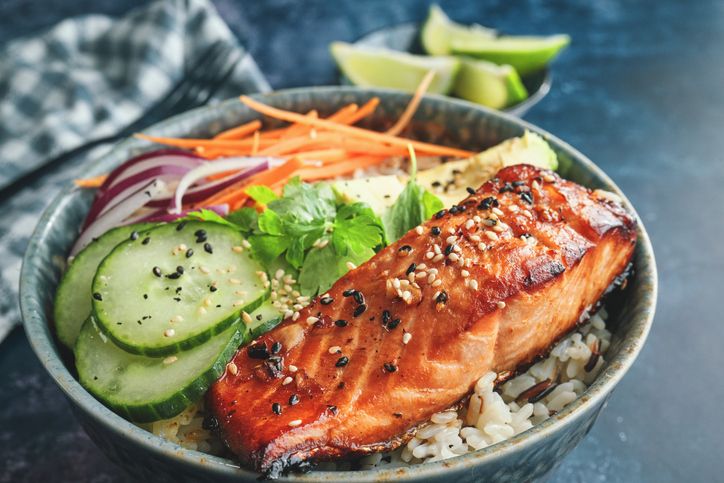
Strengthening hair with essential fatty acids
Wild-caught salmon is a key food for anyone looking to support hair growth and stop hair fall. It provides a rich source of omega-3 fatty acids, which nourish hair follicles and help maintain a healthy hair cycle. Omega-3 fatty acids are important because they help reduce scalp inflammation, one of the risk factors that can cause diffuse hair loss and thinning hair over time.
Promoting healthy hair growth with vitamins and minerals
Salmon contains high-quality hair protein that builds the structure of hair strands. It also offers vitamin D, a nutrient that helps create new hair follicles and protects existing ones. A lack of vitamin D can slow down the hair cycle and lead to thinning or dry hair.
Selenium, another important mineral found in salmon, supports thyroid function, which directly affects hair development. Without enough selenium, hair loss and slow hair growth can become bigger problems. Salmon is also packed with vitamin B12, which helps your body produce red blood cells. More red blood cells mean better oxygen and nutrient delivery to the scalp, ensuring hair follicles receive what they need to grow strong and healthy.
Best ways to eat salmon for hair health
For the best results, aim to eat wild-caught salmon twice a week. Baking or poaching the fish helps preserve its essential nutrients like omega-3 fatty acids, vitamin D, and selenium. These cooking methods avoid excessive heat that could damage the fatty acids and other nutrients that support hair health.
Eating salmon regularly as part of a balanced diet gives your body the essential nutrients it needs to support hair follicles, strengthen hair structure, and promote healthy hair growth naturally.
Read More
Book Now to Experience
F8 Hair Regrowth Treatment
1 Minute Self-Registration
Date should not be before minimal date

Vitamin-Packed Sweet Potatoes
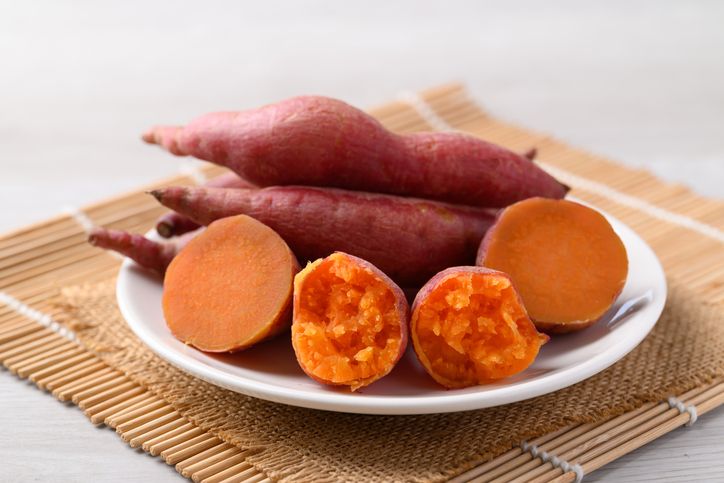
Boosting hair health with beta-carotene
Sweet potatoes are loaded with beta-carotene, a nutrient your body converts into vitamin A. Vitamin A supports healthy sebum production, which keeps the scalp moisturized and protects hair follicles. A healthy scalp is essential for maintaining strong hair strands and promoting healthy hair growth. Without enough vitamin A, hair can become dry, brittle, and prone to breakage.
Supporting hair strength with copper and vitamin C
Sweet potatoes also provide copper, which plays a role in the production of melanin. Melanin protects hair color and can slow down the appearance of dullness linked to aging or damage. In addition, sweet potatoes are rich in vitamin C. Vitamin C helps the body absorb iron from plant foods and other green leafy vegetables, improving red blood cell production and ensuring hair follicles receive enough oxygen and nutrients.
Vitamin C also promotes collagen production, which strengthens the hair structure and supports wound healing processes important for scalp health.
Easy ways to include sweet potatoes
To get the benefits, try baking or steaming sweet potatoes two to three times a week. This preserves their vitamins and minerals while providing an easy, nutrient-dense addition to meals.

Iron-Rich Leafy Greens
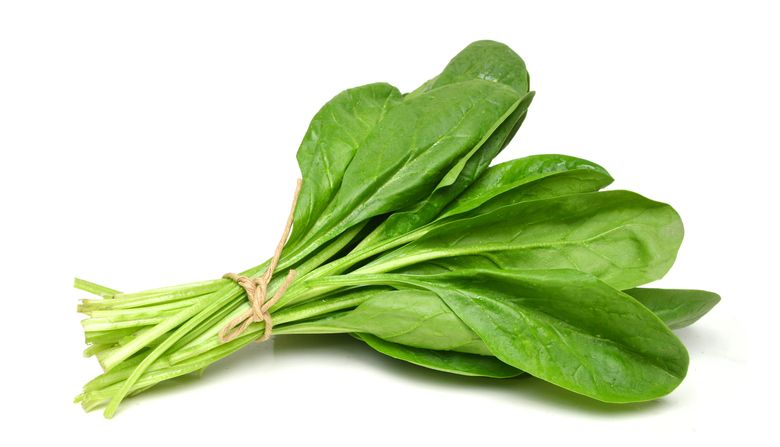
Preventing hair fall with better iron levels
Iron-rich leafy greens like spinach, kale, and Swiss chard are essential for preventing hair fall linked to iron deficiency. Iron supports the production of hemoglobin in red blood cells, which helps deliver oxygen to the scalp and hair follicles. Without enough iron, the scalp may not get the oxygen it needs, leading to weakened hair follicles and slower hair growth.
More nutrients that support hair health
These leafy greens are also high in folic acid, vitamin C, and beta carotene. Folic acid helps the body form healthy red blood cells, while vitamin C improves iron absorption. Beta carotene supports scalp health by promoting healthy cell turnover.
Eating leafy greens regularly can protect hair follicles, promote hair development, and help prevent thinning hair associated with nutritional deficiencies.
Easy cooking tips for better absorption
Steam greens lightly for 3-5 minutes to preserve their iron content. Pair them with a source of vitamin C like citrus fruits or bell peppers to boost the body’s ability to absorb iron. Adding a small amount of healthy fats, like olive oil, also helps the body absorb fat-soluble vitamins such as vitamin A.
Book Now to Experience
F8 Hair Regrowth Treatment
1 Minute Self-Registration
Date should not be before minimal date

Zinc-Loaded Pumpkin Seeds
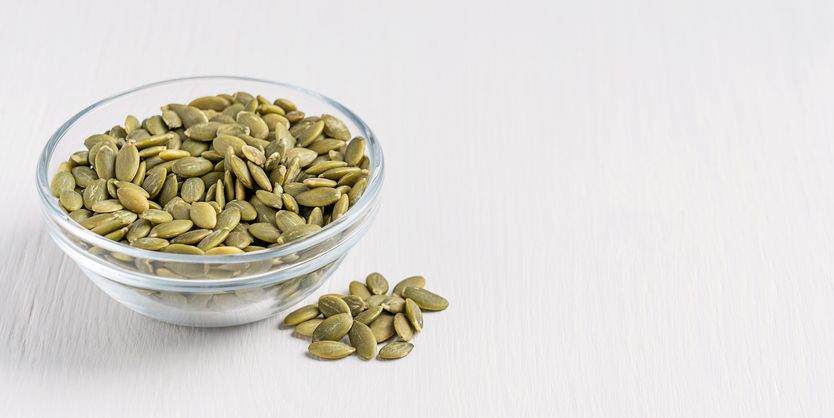
Supporting hair growth with zinc
Pumpkin seeds are a simple and effective way to add more zinc to your anti-hair fall diet. Zinc helps support hair tissue repair and ensures the oil glands around hair follicles work properly. A zinc deficiency can lead to hair loss, thinning hair, and poor scalp health.
Other nutrients that boost hair strength
Besides zinc, pumpkin seeds are rich in iron, omega-3 fatty acids, and biotin — all critical for hair health. These nutrients help build keratin, the main hair protein, promoting strong, resilient hair strands.
How to prepare pumpkin seeds for best results
To keep their nutrients intact, roast pumpkin seeds at 325°F (165°C) for about 20-25 minutes. Toss them lightly with olive oil before roasting to add healthy fats that help with nutrient absorption. Keep your portions between 1-2 tablespoons per day, either sprinkled over salads, blended into smoothies, or eaten as a snack.
Regularly eating pumpkin seeds can help strengthen your hair follicles, promote healthy hair growth, and prevent hair fall caused by poor nutrition or zinc deficiency.

Biotin-Boosting Eggs and Avocados
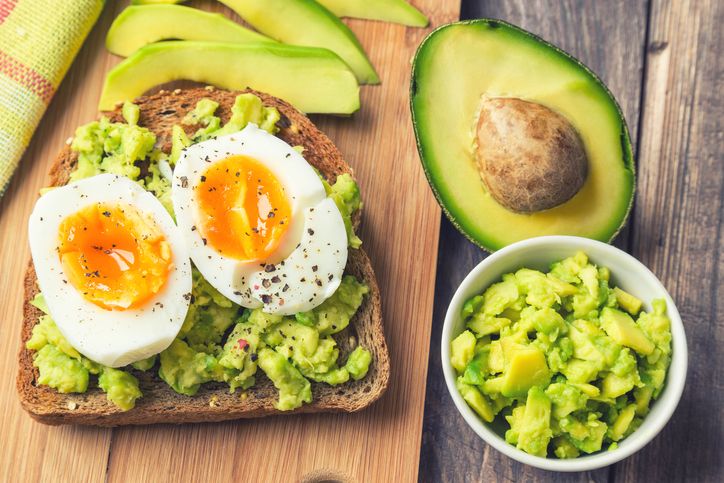
Strengthening hair follicles with biotin
Eggs are one of the best sources of biotin, an essential B vitamin that supports keratin production. Keratin is the building block of hair strands. Eating eggs regularly helps strengthen hair follicles from within and supports healthy hair development. A biotin deficiency can lead to dry hair, thinning hair, and even hair loss.
Healthy fats that protect hair cells
Avocados are rich in healthy fats, especially monounsaturated fats, which nourish the scalp and improve blood circulation. They also provide vitamin E, a powerful antioxidant that protects hair cells from oxidative stress. Good circulation ensures that hair follicles receive enough nutrients to promote healthy hair growth and prevent hair thinning.
Simple ways to add eggs and avocados to your diet
Aim to eat one whole egg and half an avocado daily. They work well together in dishes like poached eggs on avocado toast, or you can add them to salads and grain bowls. This easy combination delivers essential fatty acids, vitamins, and minerals that support hair strength and stop hair fall.
Book Now to Experience
F8 Hair Regrowth Treatment
1 Minute Self-Registration
Date should not be before minimal date

Collagen-Supporting Citrus Fruits
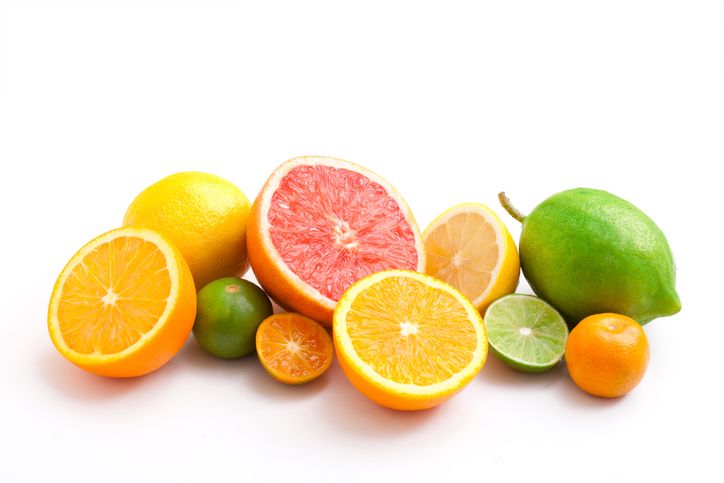
Boosting collagen for stronger hair
Citrus fruits like oranges, lemons, limes, and grapefruits are loaded with vitamin C. Vitamin C is essential for collagen production, which helps maintain the structure of hair strands and supports hair strength. Without enough collagen, hair can become weak and prone to breakage.
Protecting hair follicles with antioxidants
Citrus fruits also protect the scalp and hair follicles from oxidative damage. Their antioxidants help maintain a healthy scalp environment, supporting hair growth and preventing hair fall caused by environmental stress.
Easy ways to include citrus fruits
Include at least one serving of citrus fruits daily. Add orange slices to salads, squeeze lemon juice over steamed vegetables, or enjoy fresh grapefruit at breakfast. These small habits help ensure your body has enough vitamin C to support healthy hair.

Mineral-Dense Nuts and Seeds
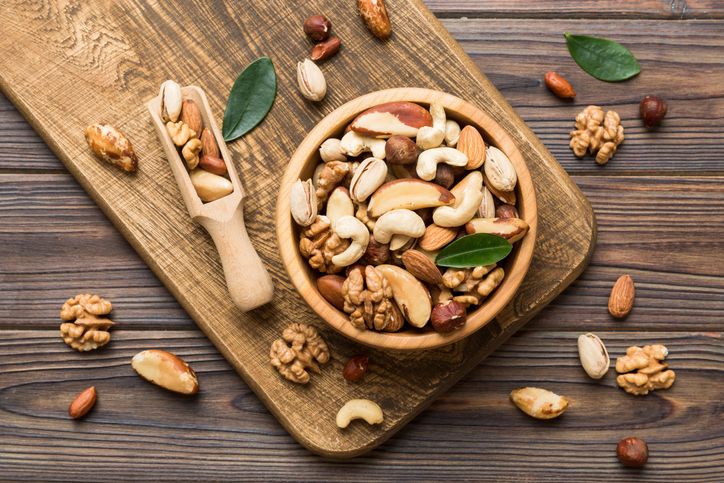
Essential minerals for hair health
Nuts and seeds like Brazil nuts, sunflower seeds, and cashews provide minerals such as zinc, selenium, and copper. These trace minerals are essential for protecting hair follicles, supporting hair structure, and promoting healthy hair growth.
Building stronger hair with nutrient combinations
Pairing different nuts and seeds can boost their benefits. Mixing pumpkin seeds with walnuts, or Brazil nuts with sunflower seeds, combines omega-3 fatty acids, zinc, selenium, and vitamin E. This combination strengthens hair strands and helps maintain scalp health, reducing the risk of hair loss and promoting strong, healthy hair growth.
Simple daily servings
A quarter cup of mixed nuts and seeds each day is enough to deliver these benefits. You can sprinkle them over yogurt, mix them into smoothies, or snack on them during the day.
Book Now to Experience
F8 Hair Regrowth Treatment
1 Minute Self-Registration
Date should not be before minimal date

Antioxidant-Rich Berries
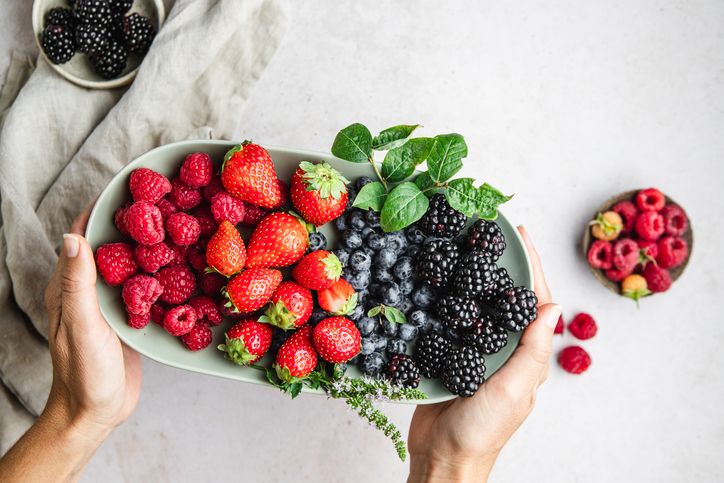
Protecting hair follicles from damage
Berries such as strawberries, blueberries, raspberries, and blackberries are packed with antioxidants that protect hair follicles from oxidative stress. Antioxidants help maintain a healthy scalp environment, which supports hair growth and helps prevent thinning hair.
Strengthening hair with vitamins and minerals
Berries provide high levels of vitamin C, which helps with collagen production and supports hair strand strength. They also offer other nutrients like silica and vitamin A that help maintain scalp and hair health.
Easy ways to eat more berries
Eat at least one cup of mixed berries daily. You can add them to smoothies, sprinkle them over oatmeal, or enjoy them as a simple snack. Frozen berries work just as well as fresh ones, making it easy to keep them on hand.

Vitamin D Superfoods
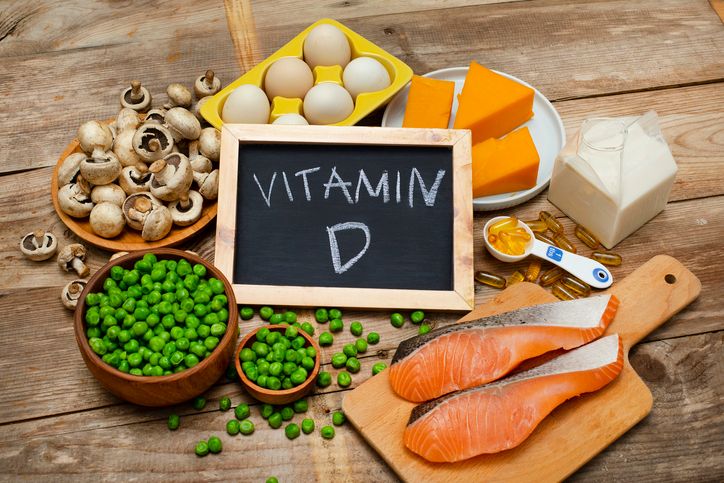
Supporting hair follicles with vitamin D
Vitamin D plays a direct role in the hair growth cycle. A vitamin D deficiency can cause hair loss, including conditions like alopecia areata and female pattern baldness. Your hair follicles need enough vitamin D to maintain healthy hair development and promote hair strength.
Best natural sources of vitamin D
Fatty fish like salmon, mackerel, and sardines are excellent sources of natural vitamin D. Eggs, especially the yolks, also contain this important nutrient. For plant-based options, vitamin D-fortified mushrooms are a good choice, as are fortified foods like milk and cereals, although natural sources are more effective.
Easy habits to get enough vitamin D
Include fatty fish in your meals two to three times per week and eat whole eggs regularly. If you rely on fortified foods, check the labels to ensure you’re meeting your daily vitamin D needs to support hair follicles and improve hair growth.
Book Now to Experience
F8 Hair Regrowth Treatment
1 Minute Self-Registration
Date should not be before minimal date

Fermented Foods for Scalp and Follicle Health
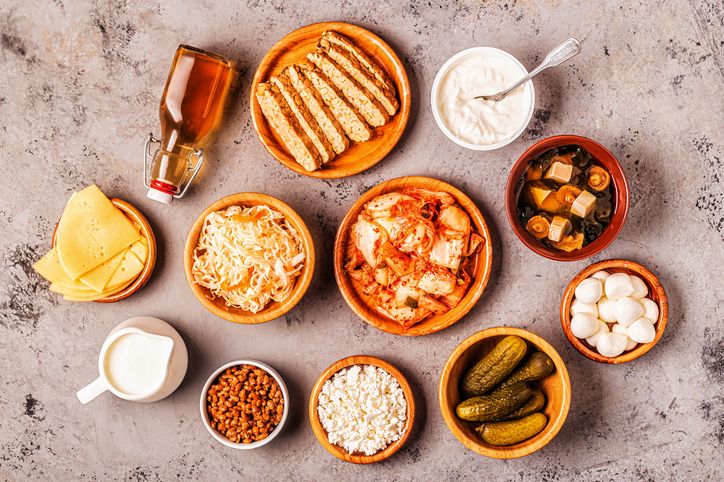
Enhancing nutrient absorption and reducing inflammation
Fermented foods like kimchi, sauerkraut, kefir, miso, and tempeh are rich in probiotics that support gut health. A healthy gut microbiome improves the absorption of essential nutrients such as biotin, iron, zinc, and vitamin D—nutrients crucial for promoting hair growth and maintaining healthy hair follicles. Additionally, the beneficial bacteria in fermented foods can help reduce systemic inflammation, which is linked to conditions like telogen effluvium and diffuse hair loss.
Supporting hair development through improved digestion
Consuming fermented foods regularly can aid in the digestion and assimilation of proteins and vitamins necessary for hair structure and strength. This improved nutrient uptake ensures that hair follicles receive the building blocks they need for healthy hair growth, potentially reducing hair thinning and supporting overall hair health.
Simple ways to include fermented foods in your diet
Incorporate a small serving of fermented foods into your meals daily. Add a spoonful of sauerkraut to your lunch, enjoy a glass of kefir as a snack, or include miso in your soups. These additions can enhance your anti-hair fall diet by supporting nutrient absorption and reducing inflammation, thereby promoting healthy hair growth.

Brewer’s Yeast: A B-Vitamin Powerhouse for Hair Strength
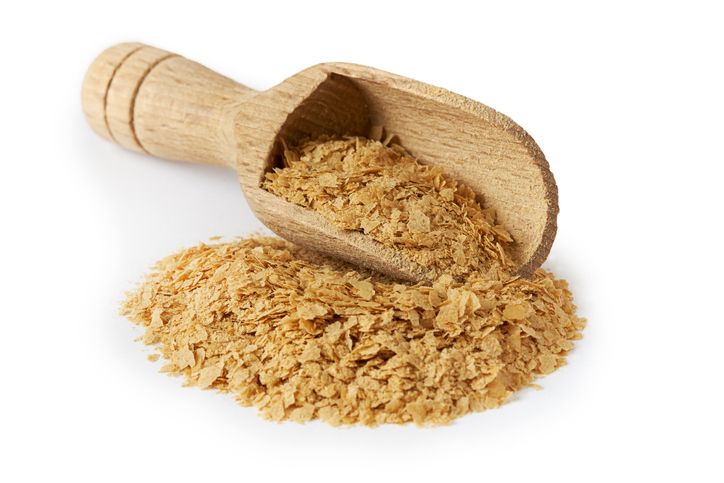
Supporting hair structure with B vitamins
Brewer’s yeast, derived from the Saccharomyces cerevisiae fungus, is rich in B-complex vitamins, including biotin (B7), folic acid (B9), and vitamin B12. These vitamins are essential for keratin production, the primary protein in hair strands, and play a crucial role in maintaining healthy hair growth and preventing hair thinning. Regular consumption can help strengthen hair follicles and promote overall hair health.
Incorporating brewer’s yeast into your diet
Brewer’s yeast is available in powder, flake, or tablet form. You can sprinkle the flakes over salads, mix the powder into smoothies, or take tablets as a supplement. Consistent intake supports the body's ability to produce strong, healthy hair strands by providing essential nutrients that protect hair follicles.
Book Now to Experience
F8 Hair Regrowth Treatment
1 Minute Self-Registration
Date should not be before minimal date

Fermented Rice Water: Traditional Elixir for Hair Vitality
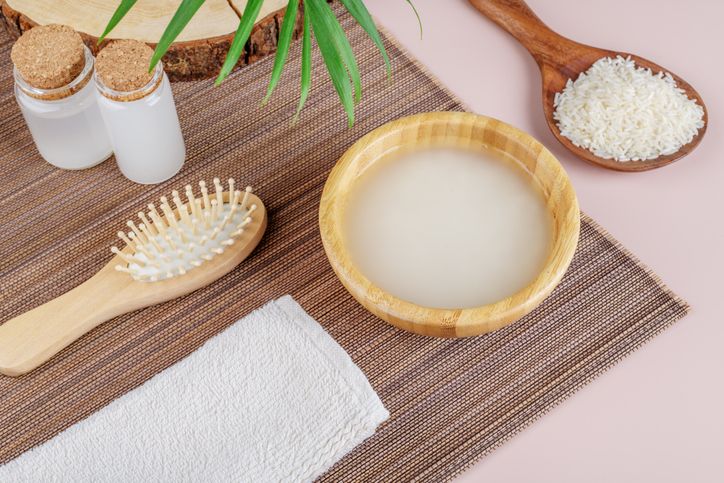
Enhancing hair elasticity and shine
Fermented rice water, a traditional remedy used in various Asian cultures, is rich in amino acids, antioxidants, and vitamins B and E. These nutrients help improve hair elasticity, reduce surface friction, and enhance shine. The fermentation process increases the availability of these nutrients, making them more effective in nourishing hair strands and promoting healthy hair growth.
Application methods for optimal results
To use fermented rice water, rinse rice thoroughly, soak it in water for 24–48 hours at room temperature, then strain the liquid. Apply the fermented water to your scalp and hair after shampooing, leave it on for 10–20 minutes, and rinse thoroughly. Incorporating this treatment once or twice a week can help strengthen hair follicles and prevent hair thinning.

Kombucha: Probiotic Beverage Supporting Scalp Health
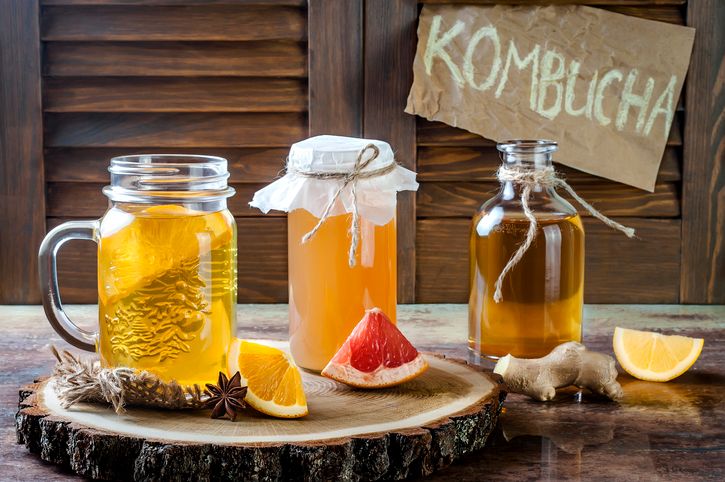
Balancing scalp microbiota for reduced hair fall
Kombucha, a fermented tea beverage, contains probiotics and antioxidants that support a healthy gut microbiome, which is linked to improved nutrient absorption and reduced inflammation. A balanced gut microbiome can positively affect scalp health, creating an environment conducive to healthy hair growth and reducing hair fall.
Including kombucha in your routine
Incorporate kombucha into your diet by consuming a glass daily. Choose varieties with low sugar content and live cultures to maximize benefits. Regular consumption can aid in delivering essential nutrients to hair follicles, promoting hair strength and preventing hair loss.
Book Now to Experience
F8 Hair Regrowth Treatment
1 Minute Self-Registration
Date should not be before minimal date

Fermented Soy Products: Miso and Tempeh for Hair Nourishment
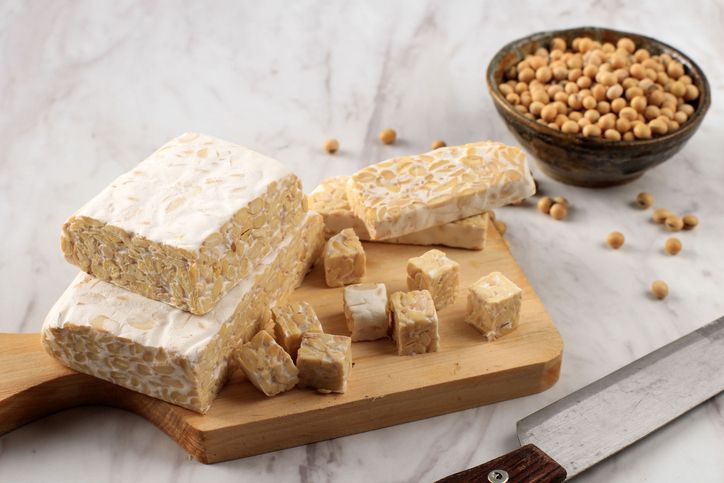
Providing essential nutrients for hair development
Fermented soy products like miso and tempeh are rich in proteins, iron, and zinc—nutrients vital for hair development. The fermentation process enhances the bioavailability of these nutrients, making them more accessible for the body to utilize in supporting healthy hair growth and maintaining hair strength.
Dietary integration for hair health
Add miso to soups or use it as a seasoning in various dishes. Tempeh can be grilled, sautéed, or added to salads and stir-fries. Including these fermented soy products in your meals several times a week can contribute to preventing hair thinning and promoting healthy hair growth by ensuring hair follicles receive essential nutrients.

F8 Hair Regrowth Treatment: Boosting the Effects of an Anti Hair Fall Diet
Supporting nutrient delivery to hair follicles
Eating the right foods is a major step toward stopping hair fall, but if your scalp isn’t absorbing nutrients efficiently, your efforts may not be enough. That’s where the F8 Hair Regrowth Treatment comes in. It works alongside your anti hair fall diet by improving scalp conditions and enhancing blood circulation — making it easier for your hair follicles to get the vitamins and minerals they need for healthy hair growth.
How the F8 treatment works
This non-invasive treatment uses low-energy laser technology and a targeted hair growth serum to stimulate inactive hair follicles and strengthen the hair papilla. The laser encourages microcirculation by supporting the surrounding capillaries, which helps deliver nutrients more effectively. After the laser step, the serum deeply cleanses and hydrates the scalp, unclogs pores, and balances oil production — all important for promoting healthy hair growth.
Key benefits of the F8 Hair Regrowth Treatment
• Helps activate hair follicles and support the hair cycle
• Improves scalp conditions by removing excess sebum and buildup
• Increases blood flow to nourish hair follicles and improve hair structure
• Suitable for both men and women with hair loss or thinning hair
• Non-surgical, painless, and requires no downtime
Why pair F8 with a balanced diet?
A diet full of essential nutrients like iron, vitamin D, omega-3 fatty acids, biotin, and vitamin C can promote hair growth and prevent hair thinning. F8 complements this by ensuring your scalp is healthy and ready to absorb those nutrients. It helps protect hair follicles, supports collagen production, and strengthens the overall foundation of your hair — amplifying the results of your nutritional changes.
If you're serious about stopping hair fall and supporting long-term hair health, combine your anti hair fall diet with the F8 Hair Regrowth Treatment. Book your consultation today and give your hair the care it needs — inside and out.
New Beauty's F8 Hair Regrowth TreatmentBook Now to Experience
F8 Hair Regrowth Treatment
1 Minute Self-Registration
Date should not be before minimal date
FAQ
1. How long does it take for an anti hair fall diet to show results?
Hair responds to changes in diet gradually. In most cases, you may begin to notice improvements in hair texture and reduced hair fall after 8 to 12 weeks of consistently following a balanced diet that includes essential nutrients like biotin, iron, omega-3 fatty acids, and vitamin D. Since hair follicles grow in cycles, it may take several months to see visible changes in hair growth or thickness.
2. Can stress or lack of sleep affect the results of a hair growth diet?
Yes, both stress and poor sleep can interfere with healthy hair growth. Stress raises cortisol levels, which may disrupt the hair cycle and lead to telogen effluvium (a temporary form of hair loss). Even if you follow an anti hair fall diet, ongoing stress or sleep issues may reduce the effectiveness of nutrient absorption and hair follicle recovery. Supporting hair health requires lifestyle changes alongside diet.
3. Are plant-based diets effective for preventing hair fall?
A plant-based diet can support healthy hair growth if planned properly. You must ensure you're getting enough protein, iron, zinc, and vitamin B12 — nutrients often lower in vegan or vegetarian diets. Including plant foods like lentils, quinoa, chia seeds, green leafy vegetables, and fortified products helps prevent nutritional deficiencies that can lead to female hair loss or thinning hair. Supplementing with B12 or iron may be necessary in some cases.
4. Does drinking water really help stop hair fall?
Hydration plays a supporting role in maintaining hair health. While drinking water alone won’t stop hair fall, it helps your body absorb vitamins and minerals that are essential for supporting hair follicles and promoting healthy hair growth. Dehydration can lead to dry hair and a lack of scalp moisture, which may worsen conditions like dandruff or sebum imbalance — both of which can affect the health of your hair strands.
5. Can I combine hair growth supplements with the F8 Hair Regrowth Treatment?
Yes, taking daily vitamin supplements — especially those containing biotin, folic acid, vitamin D, and iron — can support the effects of the F8 Hair Regrowth Treatment. Supplements fill any nutritional gaps in your diet, while the treatment improves nutrient delivery to your scalp. Combining both approaches helps strengthen hair follicles from the inside and outside, promoting long-term healthy hair growth and reducing the risk of hair thinning.
Recommended Articles
COPYRIGHT© NEW BEAUTY MANAGEMENT LIMITED 2026. ALL RIGHT RESERVED.

